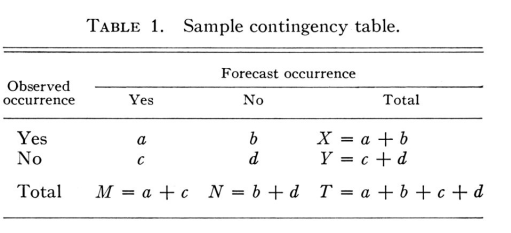The Heidke skill score is a popular measure for quantifying forecasting skill. It follows the general definition of a skill score (SS):
$$SS = \frac{l_m-l_r}{l_p-l_r},$$
with $l_p$ the loss of a perfect model (usually zero), $l_m$ the model loss and $l_r$ the loss of some reference model. Given the following convention for contingency tables:
taken from Appelman 1960, $l_m = \frac{b+c}{T}$ and $l_r = \frac{(a+c)(a+b) + (b+d)(c+d)}{T^2}$. The reference model is thus a random guessing model with the same success probability as the model predictions. This leads to a Heidke skill score of $HSS = \frac{2(ad-bc)}{(a+b)(b+d) +(a+c)(c+d)}$. This choice lets the reference model depend on the prediction model.
As an alternative, Appelman 1960 proposed a deterministic reference model, predicting "Yes" if $X>Y$ and "No" otherwise. This leads to a skill score of $\frac{d-b}{c+d}$.
My question is on a compromise between these two, i.e. a random guessing model with success probability $X/T$, so based on the observations only, without being as skewed as the choice for Appleman skill score. This reference model has as loss $l_r = 2\frac{(b+d)(a+c)}{T^2}$, with skill score $\frac{(a+c)(d-c)+(b+d)(a-b)}{2(b+d)(a+c)}$. I cannot find this skill score in the literature, has it ever been used or named? And why not?

